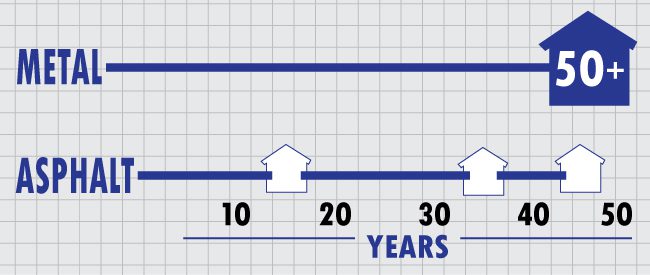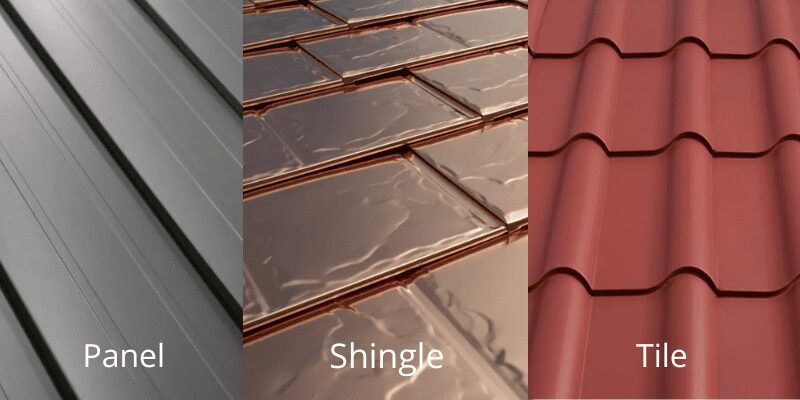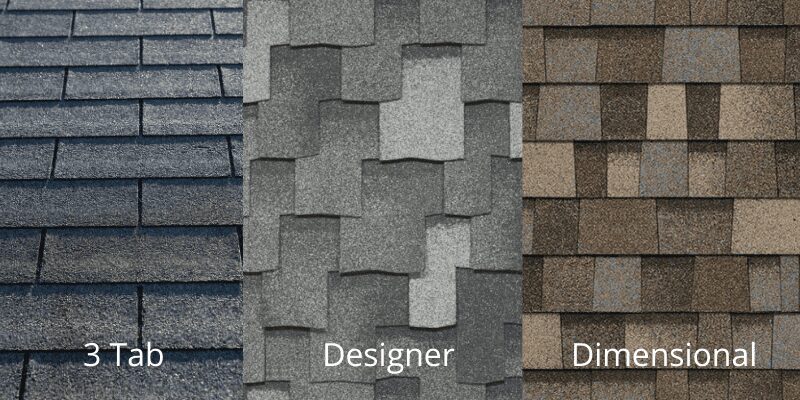The two biggest players in the roofing industry are asphalt shingles and metal roofing panels. These resilient building products deliver stellar performance and have been reliable options for decades.
Homeowners looking to replace their roof should always consider the pros and cons of both metal roofing and asphalt shingles to decide which material is best for them.
We have compared several categories to provide clear information for homeowners trying to make a decision on metal roofs vs asphalt shingles.
Longevity
The longevity of your roof is only as good as the quality of installation, your maintenance practices, and your environment.
Metal: The average lifespan of a metal roof is 40 to 70 years, depending on the type of material.
Asphalt: Asphalt shingles have a life expectancy of 15-20 years and up to 25-30 years for heavier products.

Cost
The overall cost of any roof will be affected by major factors such as the size, style, and geographic location of your home.
Metal: The initial installation cost is more expensive with an average cost of $10-$20 per square foot or $20,000-$40,000 for an average home roof of 2,000 square feet. Since a metal roof lasts so long, you do not need to replace them as often. Therefore, the overall lifetime cost is lower for homeowners.
Asphalt: Less expensive initial installation cost with an average of $6-$9 per square or $12,000-$18,000 for an average home roof of 2,000 square feet. But it’s important to keep in mind asphalt shingles have a higher life cycle cost. They have to be replaced more often and each time you pay the full installation cost again.

Energy Efficiency
Your roofing materials affect the energy efficiency and cost of utilities in your home throughout the year.
Metal
Pros:
- Metal reflects rays and does not retain as much heat.
- On average, metal roofing saves up to 30% of cooling-related energy.
Cons:
- Poor initial installation leads to less efficiency.
- The energy-cost savings are not always substantial over a short period.
Asphalt
Pros:
- Works great in mild or colder climates to trap heat and keep the home warm.
Cons:
- Shingles may increase home temperature and make home hotter during summer, increasing the drain on your HVAC system.
Eco-Friendliness
The environmental impact of asphalt shingles and metal roofing is astounding. U.S. landfills receive nearly 20 billion pounds of old asphalt shingles annually.
Metal: It is made from recycled materials which require less energy for production. Also, it can be continuously recycled at the end of its lifespan.
Asphalt: Shingles are difficult to sort and recycle so they typically end up in landfills after removal. Asphalt is a petroleum-based product and increases dependency on fossil fuels which is not good for the environment.
Durability
This compares the ability of both materials to withstand elements from mother nature and other impacts without compromising its integrity.
Metal
Pros:
- Naturally resistant to water damage, rot, and fire.
- Lightweight and strong.
- Standard metal roof coating prevents rust.
- Sheds snow and ice faster.
Cons:
- Metal can be dented by hail and other debris and can be very noticeable.
- Rust-resistant coatings add to the total cost and may need to be maintained every few years.
Asphalt
- There are new innovations in shingles that make them both impact-resistant and fire-resistant.
- Impact by hail is more difficult to notice.
Cons:
- Shingles curl and break towards the end of their life.
- Asphalt is absorptive and more susceptible to water damage.
- In humid areas, shingles are prone to moss and algae growth.
Return on Investment
Buyers expect a new or relatively new roof when purchasing a home. No one wants to buy a home and know that in the near future they are going to have to make the investment to replace the roof.
If you are selling your home, replacing the roof can make your home more appealing to buyers and even increase its value. According to homeadvisor.com, a newly replaced roof has a 68.4 percent ROI.
Due to the benefits of metal roofing, it can easily increase the resale value of your home and set it apart from others being sold in the area. But, it is important to keep in mind that if you plan to move out within a few years of installing a metal roof, you may not recoup enough of the cost, thus reducing your return on your investment.
Because asphalt shingles are the “standard” roofing material, they do not have as large of an impact on the resell value as metal.
Maintenance
Taking care of your roof is an important part of homeownership and is often required by your homeowner’s insurance policy.
Metal
- Proper installation requires little to no maintenance throughout its life.
Cons:
- It is difficult to replace or repair one section of the roof and often requires the entire roof to be redone.
Asphalt
- You can often spot problems from the ground level so you can schedule maintenance as soon as possible.
Cons:
- Regular inspection and maintenance is required to extend longevity.
Variety
Today’s homeowners want more color and style options when it comes to installing a new roof.
Metal: Metal roofs can be painted almost any color and the different materials offer attractive looks, textures, and designs. They can also be molded to mimic asphalt shingles, shake and slate shingles, and clay tiles.

Asphalt: There is a wide range of options, colors, designs, and styles, suitable for traditional and contemporary homes. Shingles can even be combined to produce a 3D design.

What to Consider Before You Choose a Metal or Shingle Roof
While metal roofing materials are gaining popularity, that doesn’t mean it is the best choice for all homeowners.
It’s important to consider the following factors before deciding which material is best for you:
- Budget – This is likely the most important factor to consider. If you don’t have the budget for metal, shingles are the better option.
However, it may be worth considering cheaper metal roof options that offer better durability than shingles to reap some of the benefits of longevity while keeping a smaller budget.
- Roof Design – Most manufacturers specify a minimum and maximum slope allowed for both asphalt and metal. This may dictate the materials that are (or are not) available to you.
- Environment – Asphalt shingles work great in some areas of the country while metal roofing may be a better option for others.
If you live in an area that is prone to fire, high wind, hail, extreme heat or cold, metal roofing is a better choice.
However, if you live in a more mild and dry climate, asphalt shingles might be the way to go.
- Qualified Contractor Availability – Not all roofing contractors are qualified to install metal roofing materials. There is a smaller pool of qualified contractors for metal roofing and finding a contractor with the proper licenses and proven record in your area may be difficult.
Which Will You Choose?
Are you looking for something to last generations, protect your mountain home from wildfires, or give a unique look? Metal roofing checks all the boxes.
Do you need a roof that is reliable and quick to install that protects your home and complies with your HOA requirements? Asphalt shingles are ready when you are.
Whatever you choose, get the right roofing contractor in TX with the necessary credentials to install your roof correctly and provide high-quality materials.
If you’re looking for a qualified roofer in your area, give Prime Seamless a call today!
